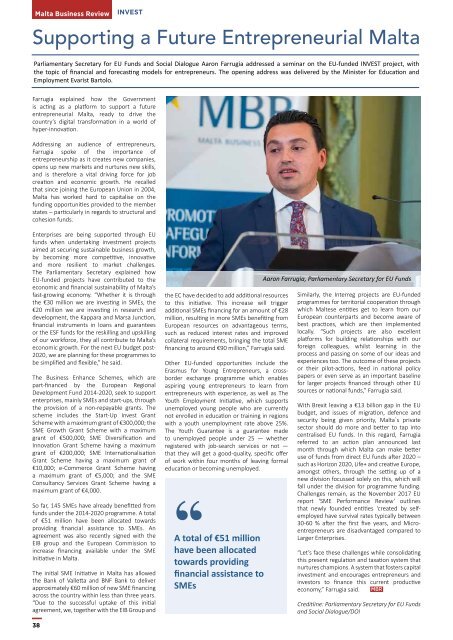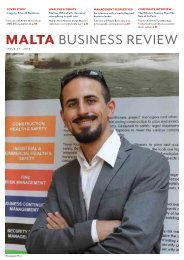MBR Issue 45
You also want an ePaper? Increase the reach of your titles
YUMPU automatically turns print PDFs into web optimized ePapers that Google loves.
Malta Business Review<br />
INVEST<br />
Supporting a Future Entrepreneurial Malta<br />
Parliamentary Secretary for EU Funds and Social Dialogue Aaron Farrugia addressed a seminar on the EU-funded INVEST project, with<br />
the topic of financial and forecasting models for entrepreneurs. The opening address was delivered by the Minister for Education and<br />
Employment Evarist Bartolo.<br />
Farrugia explained how the Government<br />
is acting as a platform to support a future<br />
entrepreneurial Malta, ready to drive the<br />
country’s digital transformation in a world of<br />
hyper-innovation.<br />
Addressing an audience of entrepreneurs,<br />
Farrugia spoke of the importance of<br />
entrepreneurship as it creates new companies,<br />
opens up new markets and nurtures new skills,<br />
and is therefore a vital driving force for job<br />
creation and economic growth. He recalled<br />
that since joining the European Union in 2004,<br />
Malta has worked hard to capitalise on the<br />
funding opportunities provided to the member<br />
states – particularly in regards to structural and<br />
cohesion funds.<br />
Enterprises are being supported through EU<br />
funds when undertaking investment projects<br />
aimed at securing sustainable business growth,<br />
by becoming more competitive, innovative<br />
and more resilient to market challenges.<br />
The Parliamentary Secretary explained how<br />
EU-funded projects have contributed to the<br />
economic and financial sustainability of Malta’s<br />
fast-growing economy. “Whether it is through<br />
the €30 million we are investing in SMEs, the<br />
€20 million we are investing in research and<br />
development, the Kappara and Marsa Junction,<br />
financial instruments in loans and guarantees<br />
or the ESF funds for the reskilling and upskilling<br />
of our workforce, they all contribute to Malta’s<br />
economic growth. For the next EU budget post-<br />
2020, we are planning for these programmes to<br />
be simplified and flexible,” he said.<br />
The Business Enhance Schemes, which are<br />
part-financed by the European Regional<br />
Development Fund 2014-2020, seek to support<br />
enterprises, mainly SMEs and start-ups, through<br />
the provision of a non-repayable grants. The<br />
scheme includes the Start-Up Invest Grant<br />
Scheme with a maximum grant of €300,000; the<br />
SME Growth Grant Scheme with a maximum<br />
grant of €500,000; SME Diversification and<br />
Innovation Grant Scheme having a maximum<br />
grant of €200,000; SME Internationalisation<br />
Grant Scheme having a maximum grant of<br />
€10,000; e-Commerce Grant Scheme having<br />
a maximum grant of €5,000; and the SME<br />
Consultancy Services Grant Scheme having a<br />
maximum grant of €4,000.<br />
So far, 1<strong>45</strong> SMEs have already benefitted from<br />
funds under the 2014-2020 programme. A total<br />
of €51 million have been allocated towards<br />
providing financial assistance to SMEs. An<br />
agreement was also recently signed with the<br />
EIB group and the European Commission to<br />
increase financing available under the SME<br />
Initiative in Malta.<br />
The initial SME Initiative in Malta has allowed<br />
the Bank of Valletta and BNF Bank to deliver<br />
approximately €60 million of new SME financing<br />
across the country within less than three years.<br />
“Due to the successful uptake of this initial<br />
agreement, we, together with the EIB Group and<br />
the EC have decided to add additional resources<br />
to this initiative. This increase will trigger<br />
additional SMEs financing for an amount of €28<br />
million, resulting in more SMEs benefiting from<br />
European resources on advantageous terms,<br />
such as reduced interest rates and improved<br />
collateral requirements, bringing the total SME<br />
financing to around €90 million,” Farrugia said.<br />
Other EU-funded opportunities include the<br />
Erasmus for Young Entrepreneurs, a crossborder<br />
exchange programme which enables<br />
aspiring young entrepreneurs to learn from<br />
entrepreneurs with experience, as well as The<br />
Youth Employment Initiative, which supports<br />
unemployed young people who are currently<br />
not enrolled in education or training in regions<br />
with a youth unemployment rate above 25%.<br />
The Youth Guarantee is a guarantee made<br />
to unemployed people under 25 — whether<br />
registered with job-search services or not —<br />
that they will get a good-quality, specific offer<br />
of work within four months of leaving formal<br />
education or becoming unemployed.<br />
"A total of €51 million<br />
have been allocated<br />
towards providing<br />
financial assistance to<br />
SMEs<br />
Aaron Farrugia, Parliamentary Secretary for EU Funds<br />
Similarly, the Interreg projects are EU-funded<br />
programmes for territorial cooperation through<br />
which Maltese entities get to learn from our<br />
European counterparts and become aware of<br />
best practices, which are then implemented<br />
locally. “Such projects are also excellent<br />
platforms for building relationships with our<br />
foreign colleagues, whilst learning in the<br />
process and passing on some of our ideas and<br />
experiences too. The outcome of these projects<br />
or their pilot-actions, feed in national policy<br />
papers or even serve as an important baseline<br />
for larger projects financed through other EU<br />
sources or national funds,” Farrugia said.<br />
With Brexit leaving a €13 billion gap in the EU<br />
budget, and issues of migration, defence and<br />
security being given priority, Malta`s private<br />
sector should do more and better to tap into<br />
centralised EU funds. In this regard, Farrugia<br />
referred to an action plan announced last<br />
month through which Malta can make better<br />
use of funds from direct EU funds after 2020 –<br />
such as Horizon 2020, Life+ and creative Europe,<br />
amongst others, through the setting up of a<br />
new division focussed solely on this, which will<br />
fall under the division for programme funding.<br />
Challenges remain, as the November 2017 EU<br />
report 'SME Performance Review' outlines<br />
that newly founded entities ‘created by selfemployed<br />
have survival rates typically between<br />
30-60 % after the first five years, and Microentrepreneurs<br />
are disadvantaged compared to<br />
Larger Enterprises.<br />
“Let’s face these challenges while consolidating<br />
this present regulation and taxation system that<br />
nurtures champions. A system that fosters capital<br />
investment and encourages entrepreneurs and<br />
investors to finance this current productive<br />
economy,” Farrugia said. <strong>MBR</strong><br />
Creditline: Parliamentary Secretary for EU Funds<br />
and Social Dialogue/DOI<br />
38





